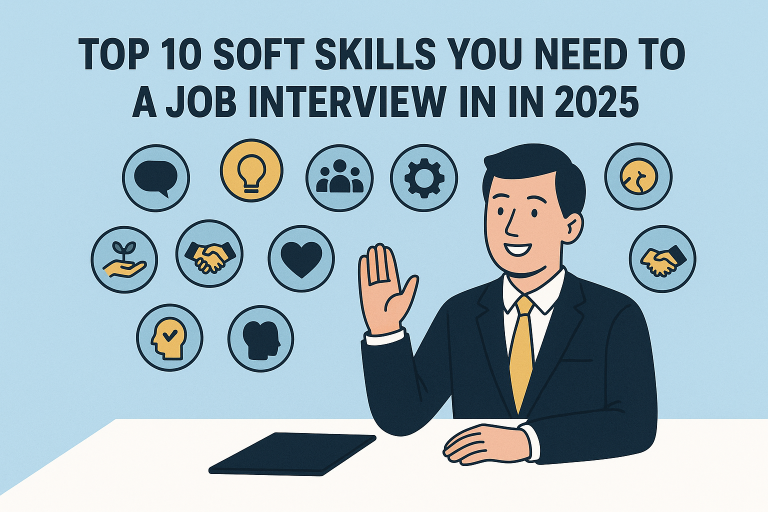In 2025, landing a job isn’t just about your degree or the number of tools you’ve mastered. Employers today are prioritizing who you are just as much as what you know. They’re searching for people who can think critically, communicate clearly, collaborate effectively, and adapt swiftly.
These essential human qualities — often called soft skills — have become game-changers in today’s job market. You might have all the right technical expertise, but without the right attitude, mindset, and interpersonal finesse, it’s hard to stand out in a competitive interview.
So, if you’re preparing to face interviews this year, here are the 10 most powerful soft skills you need to focus on.
1. Effective Communication: Speak and Listen with Purpose
Great communication is more than just speaking clearly. It’s about conveying your message with confidence, listening attentively, and responding with intent.
In job interviews, how you express yourself often leaves a stronger impression than what you say. Avoid rambling. Think before you speak. Maintain eye contact and show that you’re engaged. Listening is equally critical — your attentiveness shows respect and emotional maturity.
2. Adaptability: Embrace Change with a Positive Mindset
Today’s work environment is constantly evolving. Technology shifts, remote work, global teams — you name it.
Employers want individuals who can adapt quickly, learn fast, and remain composed when things don’t go as planned. Share real-life examples of how you handled sudden changes or overcame unfamiliar challenges. This shows that you’re not just reactive, but proactive and open-minded.
3. Emotional Intelligence: Read the Room and React Wisely
Emotional intelligence — your ability to recognize emotions (yours and others’) — plays a major role in how well you interact with people.
In interviews, it shows up when you respond thoughtfully to questions, handle stress calmly, or show empathy while talking about past team experiences. Companies are eager to hire emotionally intelligent people because they foster better teamwork and communication.
4. Critical Thinking: Break Down Problems Like a Pro
When you’re faced with a challenge, do you pause and analyze before jumping to conclusions? If so, you’re already practicing critical thinking — one of the most in-demand soft skills today.
Interviewers love candidates who can evaluate situations logically, ask the right questions, and offer practical solutions. When asked about difficult situations, walk them through your thought process, not just the outcome.
5. Collaboration: Work Well with Others, Always
No matter how talented you are individually, you’ll likely be working within a team. That’s why collaboration is key.
Show you can listen to other viewpoints, compromise when needed, and support your colleagues. Talk about group projects, volunteer work, or any experience where teamwork played a crucial role. Team players get hired faster than solo heroes.
6. Time Management: Prove That You Can Prioritize
Time is money — and employers want people who can manage it well. Whether it’s meeting deadlines or juggling multiple tasks, effective time management shows responsibility.
In interviews, avoid simply saying you’re “good with time.” Instead, share an instance where your ability to prioritize tasks saved a project or helped avoid a crisis. That paints a stronger, more convincing picture.
7. Problem-Solving: Be a Thinker, Not a Complainer
Every role exists to solve some kind of problem. Show that you’re the kind of person who steps up when challenges arise.
Talk about a time when you identified an issue and actively worked toward a solution — especially if it required creative thinking or collaboration. Employers appreciate people who don’t bring problems, but bring answers.
8. Confidence: Own Your Value Without Boasting
Confidence isn’t about being loud or assertive — it’s about believing in yourself without being arrogant. When you walk into an interview with self-assurance, it shows.
Be prepared to talk about your achievements, but stay humble. If you’re unsure about something, be honest and express your willingness to learn. That kind of confidence makes a strong impression.
9. Leadership: Show Initiative, Even Without a Title
Leadership is not just about managing a team. It’s about taking initiative, making decisions, and inspiring others even when you’re not officially “in charge.”
During interviews, mention moments when you took responsibility or helped drive a group to success. Even if you’re a fresher, leading a project, organizing an event, or mentoring a peer counts.
10. Resilience: Stay Strong When Things Get Tough
No job comes without stress or setbacks. The question is — how do you handle them?
Employers admire resilience — the ability to stay motivated, bounce back from failures, and learn from mistakes. When discussing past experiences, highlight how you turned difficulties into opportunities. This shows mental strength and a growth-oriented mindset.
In Conclusion
In 2025, interviews are less about how perfectly you answer technical questions and more about how you carry yourself. Your mindset, attitude, and ability to interact meaningfully with others will carry as much weight as your resume.
So, start developing these soft skills today. Reflect on your experiences, practice storytelling for interviews, and observe how you work with others. The more naturally these skills shine through during your conversations, the higher your chances of landing the job.
Remember, it’s your human side that truly differentiates you from others. Let your soft skills speak just as loudly as your technical ones — and you’ll be interview-ready for any opportunity that comes your way.



